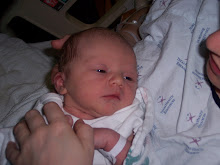Update to post below: When I told my mom and grandmother what Caroline did and asked them what it meant, they both said "well, it just means Caroline can say the word "poo poo". So chalk this one up to addding a word to Caroline's vocabulary and not a sign that we should be tossing those diapers. Much ado about nothing. And boy, I better start researching this potty training thing seeing as I obviously know NOTHING about it :-)
If you do not want to read about a child's bodily functions, do not keep reading this post. Don't say you weren't warned :-) So I'm totally freaking out a little bit...I just went into Caroline's room to get her up from her afternoon nap. She was sitting up in her crib and as soon as she saw me, she grabbed her diaper and said "poo poo, poo poo"...and sure enough, she had a dirty diaper. We've been doing some pre-potty training awareness stuff like I tell her what it is and point it out when she goes and I sit her on the toilet before baths just to get her used to the feeling. But I've had NO intention of potty training until, what, 2 1/2-3 years?!? Isn't that when kids potty train?? I guess I need to do some research in this area but I thought I'd ask my trusty, wise, blog friends first. When do you know if your kid is ready to potty train?? And what does it mean if they can tell you when they went?? Not that I'm going to start potty training anytime soon (um, hello??, my daughter is only 14 months old) but I'd like to know more about the subject from all you smart mommies out there :-)











3 comments:
Hi Laura!
I don't think I count as a wise mommy because we are in the same stage as you guys but here are my thoughts on potty training. I was potty trained by 18 months and most babies our age and older were too. Now that disposable diapers are around it's easier to postpone potty training but I think you should do whatever works for you. We are doing the same thing with Brady...sitting him on the potty and all that jazz but I consider that potty training. I know that he will probably be older when he goes to restroom and does everything by himself, which is what some people consider potty trained, but I'm ok with "being trained for him" for a while if it means less diapers to change. Good luck!
I have no idea but am interested in learning from you. Share with me what you decide and learn!
This is a HUGE topic, but I know from personal experience that children can be completely potty trained between 18 and 24 months with no problem, some even earlier. I started putting my son on the potty at 11 months, and now at 20 months he regularly tells me when he needs to go (he usually grabs his pants and says "uhh uhh" since he doesn't talk yet). He still has pee pee accidents but not as much as he used to. As long as I am aware of when he went potty last and how much water he has had to drink then I usually can know when to put him on next, even if he doesn't tell me. He never doodoo's in his pants any more. He doesn't wear diapers during the day any more, even to go outside (except at nap time). When going out, I just take a change of clothes with me just in case, and I frequently remind him to tell me when he needs to go.
After a child starts on solids it gets more disgusting to change doodoo diapers and gets worse as they get older so I would suggest you work on that first. Definitely don't wait until 2 1/2 or 3, or your stomach will die a thousand deaths! Most children have a set time of day when they go or you can tell when they are about to go by the look on their face. That would be the time to say "Hold it. Let's go on the potty." and then put her on. If she doesn't like sitting on the toilet then a potty would be a good idea.
Yes, it will take work on your part and you will have to be there to make sure it gets done, but remember that every time she goes in the potty is one less diaper to change and eventually you won't spend so much on diapers. That is always something to look forward to. :) Take her telling you about the dirty diaper as a good sign that she is ready to be potty trained.
Post a Comment